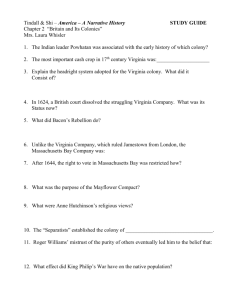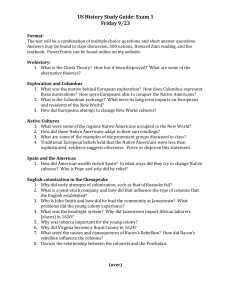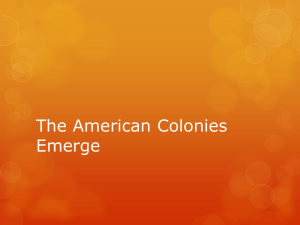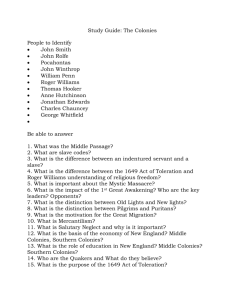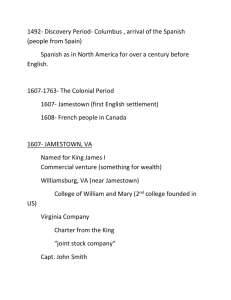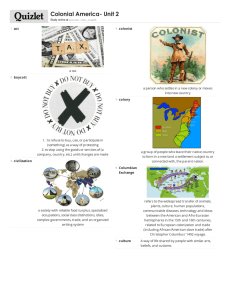APUSH Summer Reading List for summer of 2007
advertisement
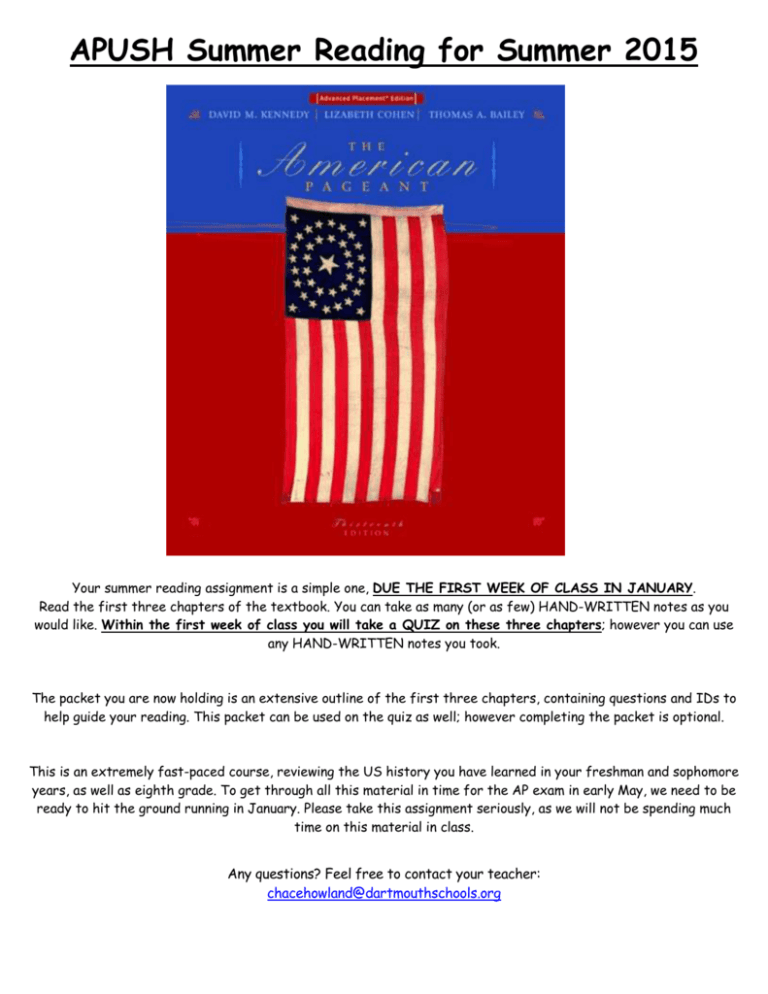
APUSH Summer Reading for Summer 2015 Your summer reading assignment is a simple one, DUE THE FIRST WEEK OF CLASS IN JANUARY. Read the first three chapters of the textbook. You can take as many (or as few) HAND-WRITTEN notes as you would like. Within the first week of class you will take a QUIZ on these three chapters; however you can use any HAND-WRITTEN notes you took. The packet you are now holding is an extensive outline of the first three chapters, containing questions and IDs to help guide your reading. This packet can be used on the quiz as well; however completing the packet is optional. This is an extremely fast-paced course, reviewing the US history you have learned in your freshman and sophomore years, as well as eighth grade. To get through all this material in time for the AP exam in early May, we need to be ready to hit the ground running in January. Please take this assignment seriously, as we will not be spending much time on this material in class. Any questions? Feel free to contact your teacher: chacehowland@dartmouthschools.org CHAPTER 1: NEW WORLD BEGINNINGS: 33, 000 B.C.—A.D. 1769 Introduction Know: Old World, New World 1. What conditions existed in what is today the United States that made it "fertile ground" for a great nation? The Shaping of North America Know: Appalachian Mountains, Tidewater Region, Rocky Mountains, Great Basin, Great Lakes, Missouri-Mississippi-Ohio River System 2. Speculate how at least one geographic feature affected the development of the United States. Peopling the Americas Know: Land Bridge 3. "Before the arrival of Europeans, the settlement of the Americas was insignificant." Assess this statement. The Earliest Americans Know: Maize, Aztecs, Incas, Pueblo, Mound Builders, Three-sister Farming, Cherokee, Iroquois 4. Describe some of the common features North American Indian culture. Indirect Discoverers of the New World Know: Finland, Crusaders, Venice, Genoa 5. What caused Europeans to begin exploring? Europeans Enter Africa Know: Marco Polo, Caravel, Bartholomeu Dias, Vasco da Gama, Ferdinand and Isabella, Moors 6. What were the results of the Portuguese explorations of Africa? Columbus Comes upon a New World Know: Columbus 7. What developments set the stage for “a cataclysmic shift in the course of history?” When Worlds Collide Know: Corn, Potatoes, Sugar, Horses, Smallpox 8. Explain the positive and negative effects of the Atlantic Exchange. The Spanish Conquistadors Know: Treaty of Tordesillas, Vasco Nunez Balboa, Ferdinand Magellan, Juan Ponce de Leon, Francisco Coronado, Hernando de Soto, Francisco Pizarro, Encomienda 9. Were the conquistadors great men? Explain. Makers of America: The Spanish Conquistadors Know: Granada, Moors, "Reconquista" 10. Were the conquistadors' motives successfully fulfilled? Explain. The Conquest of Mexico Know: Hernan Cortes, Tenochtitlan, Montezuma, Mestizos 11. Why was Cortes able to defeat the powerful Aztecs? The Spread of Spanish America Know: John Cabot, Giovanni da Verazano, Jacques Cartier, St. Augustine, New Mexico, Pope's Rebellion, Mission Indians, Black Legend 12. What is the “Black Legend,” and to what extent does our text agree with it? CHAPTER 2: THE PLANTING OF ENGLISH AMERICA: 1500—1733 England's Imperial Stirrings Know: Henry VIII, Queen Elizabeth, Catholic Ireland 13. Why was England slow to establish New World colonies? Elizabeth Energizes England Know: Francis Drake, Sir Walter Raleigh, Virginia, Spanish Armada 14. What steps from 1575-1600 brought England closer to colonizing the New World? England on the Eve of Empire Know: Enclosure Movement, Primogeniture, Joint-stock company 15. Explain how conditions in England around 1600 made it "ripe" to colonize N. America. England Plants the Jamestown Seedling Know: Virginia Company, Jamestown, John Smith, Powhatan, Pocahontas, Starving Time, Lord De La Warr 16. Give at least three reasons that so many of the Jamestown settlers died. Cultural Clash in the Chesapeake Know: Powhatan's Confederacy, Anglo-Powhatan Wars 17. What factors led to the poor relations between Europeans and Native Americans in Virginia? Virginia: Child of Tobacco Know: John Rolfe, Tobacco, House of Burgesses 18. "By 1620 Virginia had already developed many of the features that were important to it two centuries later." Explain. Maryland: Catholic Haven Know: Lord Baltimore, Indentured Servants, Act of Toleration 19. In what ways was Maryland different than Virginia? The West Indies: Way Station to Mainland America Know: West Indies, Sugar, Barbados Slave Code 20. What historical consequences resulted from the cultivation of sugar instead of tobacco in the British colonies in the West Indies? Colonizing the Carolinas Know: Oliver Cromwell, Charles II, Rice 21. Why did Carolina become a place for aristocratic whites and many black slaves? The Emergence of North Carolina Know: Tuscarora 22. North Carolina was called "a vale of humility between two mountains of conceit." Explain. Late-Coming Georgia: The Buffer Colony Know: James Oglethorpe 23. In what ways was Georgia unique among the Southern colonies? Makers of America: The Iroquois Know: The Iroquois Confederacy, Deganawidah, Hiawatha, Five Nations, Handsome Lake 24. How did the political structure of the Iroquois prove to be first a strength and ultimately a weakness? The Plantation Colonies 25. Which Southern colony was the most different from the others? Explain. CHAPTER 3: SETTLING THE NORTHERN COLONIES: 1619—1700 The Protestant Reformation Produces Puritanism Know: John Calvin, Conversion Experience, Visible Saints, Church of England, Puritans, Separatists 26. How did John Calvin's teachings result in some Englishmen wanting to leave England? The Pilgrims End Their Pilgrimage at Plymouth Know: Mayflower, Myles Standish, Mayflower Compact, Plymouth, William Bradford 27. Explain the factors that contributed to the success of the Plymouth colony. The Bay Colony Bible Commonwealth Know: Puritans, Charles I, Massachusetts Bay Colony, Great Migration, John Winthrop 28. Why did the Puritans come to America? Building the Bay Colony Know: Freemen, Bible Commonwealth, John Cotton, Protestant Ethic 29. How democratic was the Massachusetts Bay Colony? Explain. Trouble in the Bible Commonwealth Know: Anne Hutchinson, Antinomianism, Roger Williams 30. What happened to people whose religious beliefs differed from others in Massachusetts Bay Colony? The Rhode Island "Sewer" Know: Freedom of Religion 31. How was Rhode Island different than Massachusetts? Makers of America: The English 32. In what ways did the British North American colonies reflect their mother country? New England Spreads Out Know: Thomas Hooker, Fundamental Orders 33. Describe how Connecticut, Maine and New Hampshire were settled. Puritans versus Indians Know: Squanto, Massasoit, Pequot War, Praying Towns, Metacom, King Philip's War 34. Why did hostilities arise between Puritans and Native Americans? What was the result? Seeds of Colonial Unity and Independence Know: New England Confederation, Charles II 35. Assess the following statement, "The British colonies were beginning to grow closer to each other by 1700." Andros Promotes the First American Revolution Know: Dominion of New England, Navigation Laws, Edmund Andros, Glorious Revolution, William and Mary, Salutary Neglect 36. How did events in England affect the New England colonies' development? Old Netherlanders at New Netherlands Know: Dutch East India Company, Henry Hudson, New Amsterdam, Patroonships 37. Explain how settlement by the Dutch led to the type of city that New York is today. Friction with English and Swedish Neighbors Know: Wall Street, New Sweden, Peter Stuyvesant, Log Cabins 38. "Vexations beset the Dutch company-colony from the beginning." Explain. Dutch Residues in New York Know: Duke of York 39. Do the Dutch have an important legacy in the United States? Explain. Penn's Holy Experiment in Pennsylvania Know: Quakers, William Penn 40. What had William Penn and other Quakers experienced that would make them want a colony in America? Quaker Pennsylvania and Its Neighbors Know: East New Jersey, West New Jersey, Delaware 41. Why was Pennsylvania attractive to so many Europeans and Native Americans? The Middle Way in the Middle Colonies Know: Middle Colonies, Benjamin Franklin 42. What do the authors mean when the say that the middle colonies were the most American?

